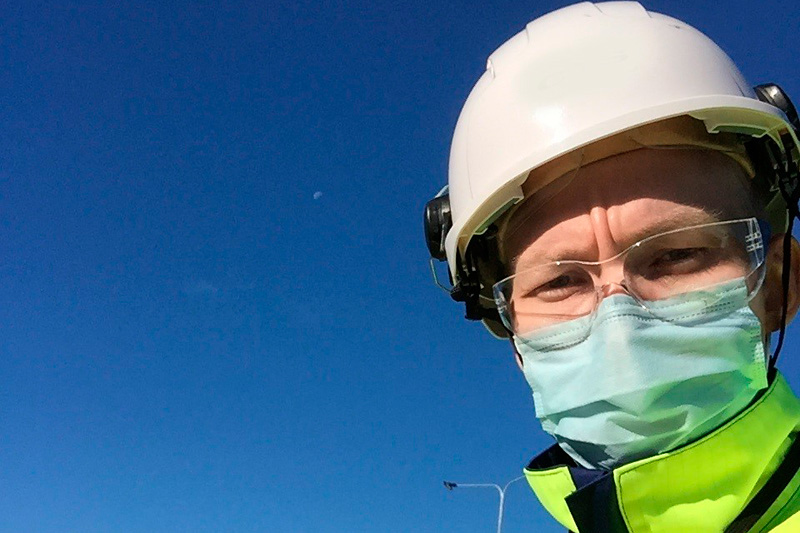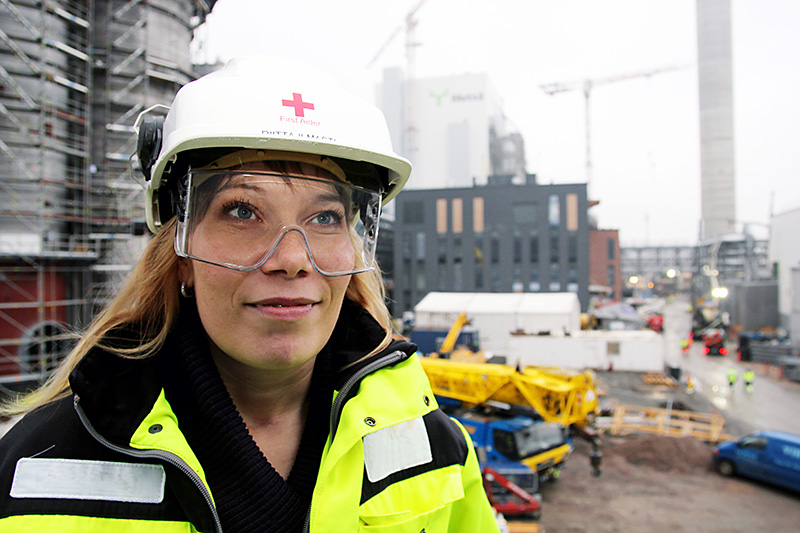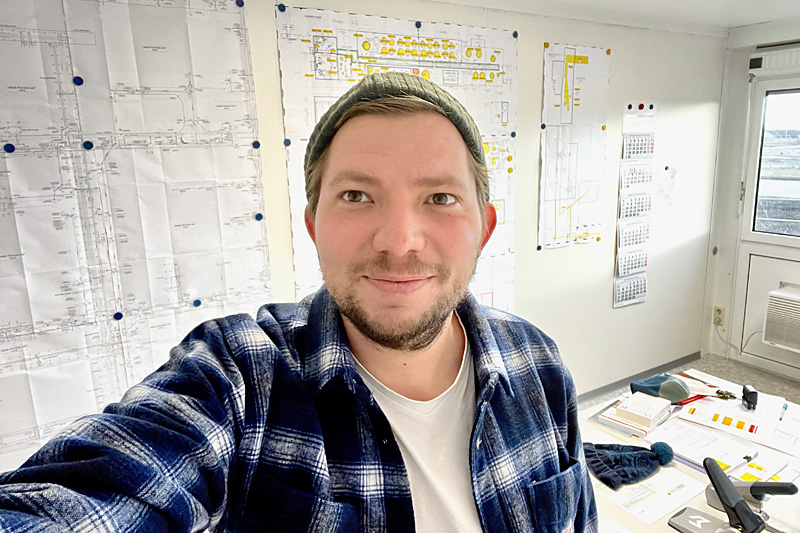Modern leaders of Fimpec, part 3: Ville Niemi

In this three-part series, we will get to know three modern leaders at Fimpec. In the third and last part, Ville Niemi, who works as a project manager, describes his adaptable leadership behaviour and its development, and reflects on the similarities between Fimpec’s and his own modern leadership.
Ville Niemi started working for Fimpec in August 2018 as a project engineer and, in a couple of years, has advanced to the role of project manager. He has spent his entire 10-year career working on energy gas projects and has great expertise and experience in the gas industry. Niemi continues to work on gas industry projects at Fimpec.
Depending on the project, his role can be either principal engineer, project engineer or project manager. He also does some Owner’s Engineering work, in which an expert from Fimpec works as part of a customer’s project organisation. Often, his key duties include guiding the engineering work, scheduling, procurement and, of course, leading the project. However, Niemi feels that managing people and things is the most significant part of his day-to-day work, as this is what project management mainly is. Managing one’s own day-to-day work is important, and the necessity of organising one’s tasks is highlighted when there are five or even 15 projects of varying scales underway at the same time.
“I have a personal ERP system,” Niemi says with a laugh. “Naturally, the project defines the schedule and the tasks. When there are multiple projects and schedules going on at the same time, it’s important to keep up to date on tasks and future plans. To do this, I use Post-its and notes made on paper. I write down to-do lists, task priorities and schedules for myself. Some might say that one could organise one’s tasks using Kanban boards or other systems, but when you have 100 windows open on your computer, I feel that it’s easier to write things down on paper and find the information you need there,” says Niemi about his way of working.
The most important thing is to keep up to date with one’s own tasks and responsibilities as well as the things that are important for the smooth running of the project. In addition to organising tasks, the ability to lead the people in the project helps make the project a success. Niemi says that the kind of leader he wants to be is also firmly tied to how he wants to lead the project to success.
“As a leader, I want to be an enabler of smooth working who is fair, honest and as inspiring and motivating as possible. To put it in a not-so-small nutshell,” Niemi says with a laugh. “This, and how I seek to lead the project to success, is built into my duties. For these things, it’s key to identify any bottlenecks, resolve any issues and pave the way for completing the project without a hitch. You can’t start to think about the project’s progress when the implementation itself is already being planned. Instead, the project must be clearly divided into parts and it must define what is wanted from it. The saying ‘well planned is half done’ fits well here and in my own work,” Niemi says.
Niemi’s passion for better and successful projects is the reason why he likes to work on projects, and it is also why he started to work in the project field.
“The success of a project feels very good, even euphoric, and that’s why I want to make the next project even better. A successful project is a very great motivator, and I can’t deny that it’s quite an addictive feeling when you complete a project in a way that fulfils all the requirements set for it. There is also another side to motivation that comes from failure and challenges. When failures happen, you want to learn from them and make sure that they never happen again. They make you try your best,” Niemi says.
Not a pigeonholed type of leader, but a hybrid leader that understands people and situations
Niemi says that his leadership skills have developed significantly since the start of his career.
“My leadership is no longer so dominated by rigid, authoritarian and self-assured behaviour and my work has taught me a softer way to lead. I have become more aware of the work environment and I’m able to detect changes in it. I’m now better and quicker at adapting my own behaviour to changes and different situations, and my behaviour is no longer so abrupt or blunt,” Niemi says.
Niemi says that he has reflected on his leadership style a lot and ended up asking a colleague for their opinion on it. The colleague told Niemi that he is a visionary and coaching leader who does a lot by himself. Niemi’s hobbies support his leadership style well.
“I don’t like to pigeonhole my leadership style as any of the well-known leadership types. I like to think of myself as some kind of a hybrid leader who can adapt their behaviour to the environment and the parties involved. However, I want to be a determined coach, and my hobbies offer plenty of support for this. I am a wrestling coach, mostly for 16-year-olds. Both as a coach and in my work, I get to think about how to make someone do their best or even surpass themselves,” Niemi says.
According to Niemi’s experiences, there is also a place in working life for firmer leadership.
“When you want decisions made and things taken forward, firmer leadership is needed. My other hobby, which is voluntary national defence activities, offers me a chance to learn a firmer leadership style,” Niemi says.
However, a key part of Niemi’s own leadership is that he can understand the situation and adapt his leadership behaviour accordingly. Niemi says that people must be considered as individuals and that different leadership styles work for different people. This means that, in addition to the various situations, it is also important to know one’s co-workers and partners and what kind of leadership each of them needs.
Performance review skills and open discussion about values are the keys to modern leadership
Niemi is especially satisfied with Fimpec’s modern leadership. “Based on my own experience, Fimpec’s management is good at giving, receiving and processing feedback and adjusting the way they work as needed. In my opinion, this is a precondition for modern leadership. Furthermore, I think that Fimpec’s way of working is such that people are able adapt their behaviour to the situation, there is no friction between people, discussions are constructive and solutions are found quickly and smoothly,” Niemi says.
In his own work, Niemi uses the same methods to strive to be a modern leader. “Managing people and things is part of my day-to-day work, so I strive to be as good of a leader as I can and learn more. Giving and receiving feedback is important in my work. The skill of giving feedback is something I have been paying special attention to. In this, too, it’s important to treat people as individuals and know their needs,” Niemi says.
According to Niemi, Fimpec’s values of openness, insight and straightforwardness are part of modern leadership. In his opinion, there must be open discussion on values, and he can also stand behind the values in question in his own work.
“If I think about my own professional values, these are the kinds of things that come up. And when I reflect on them a little more, I realise that they mean everything. You can’t achieve a positive working mood and smoothly flowing work without these values. These things must be in order throughout the company and it must be possible to discuss matters openly,” Niemi says.
According to Niemi, Fimpec’s values are increasingly visible in the company’s day-to-day activities. There are shared situation reviews where matters are discussed openly, the organisations are flat, people are easy to approach and things are easy to talk about, not forgetting the company’s great experience and expertise.
“I can’t find fault with the way work is done at Fimpec. There is a high level of trust in the management, and the individuals in the company also have plenty of expertise and motivation. Actually, from what I’ve seen, we are damn good at what we do,” Niemi says.


